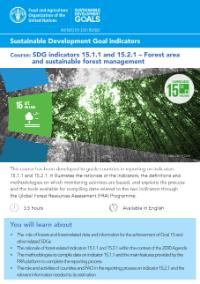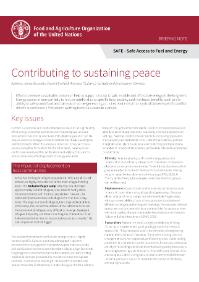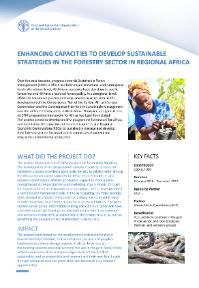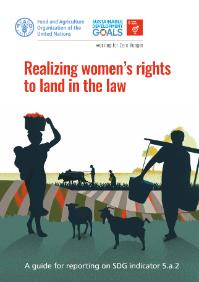Focal point
Location
The Food and Agriculture Organization of the United Nations leads international efforts to defeat hunger. Serving both developed and developing countries, FAO acts as a neutral forum where all nations meet as equals to negotiate agreements and debate policy. FAO is also a source of knowledge and information. We help developing countries and countries in transition modernize and improve agriculture, forestry and fisheries practices and ensure good nutrition for all. Since our founding in 1945, we have focused special attention on developing rural areas, home to 70 percent of the world's poor and hungry people.
Members:
Resources
Displaying 201 - 205 of 5073SDG indicators 15.1.1 and 15.2.1 – Forest area and Sustainable Forest Management
This fact sheet presents a course that has been developed to guide countries in reporting on indicators 15.1.1 and 15.2.1. It illustrates the rationale of the indicators, the definitions and methodologies on which monitoring activities are based, and explains the process and the tools available for compiling data related to the two indicators through the Global Forest Resource Assessment (FRA) Programme.
Safe Access to Fuel and Energy Briefing Note: Contributing to sustaining peace
Efforts to ensure sustainable peace can help to support access to safe, reliable and affordable energy in the long term. Energy access in turn can help to reduce conflict due to specific food security and livelihood benefits, such as the ability to safely cook food and carry out income-generating activities. An in-depth analysis of context-specific conflict drivers is a necessary first step in working towards sustainable peace.
Course: Water management for climate-smart agriculture
This fact sheet describes the following e-learning course: This course focuses on water management and its critical role in climate-smart agriculture. It analyses the impacts of climate change on the availability of freshwater resources for agriculture and considers possible water management options for adaptation to climate change and for climate change mitigation.
Enhanching Capacities to develop Sustainable Strategies in the Forestry Sector in Regional Africa - TCP RAF 3508
Over the past decades, progress towards Sustainable Forest Management (SFM) in Africa has been made at national and subregionallevels. At national level, 43 African countries have developed specific forest law and 40 have a national forest policy. At subregionallevel, efforts to harmonize policies and programmeshave resulted in the development of the Convergence Plan of the Central African Forests Commission and the Convergence Plan for the Sustainable Management and Use of Forest Ecosystems in West Africa.
Realizing women’s rights to land in the law
Goal 5 of the Sustainable Development Goals (SDGs) “Achieve gender equality and empower all women and girls” recognizes the fundamental role of women in achieving poverty reduction, food security and nutrition. Target 5.a aims to “Undertake reforms to give women equal rights to economic resources, as well as access to ownership and control over land and other forms of property, financial services, inheritance and natural resources, in accordance with national laws”.











